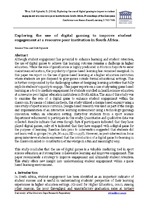Exploring the use of digital gaming to improve student engagement at a resource poor institution in South Africa
Abstract
Although student engagement has potential to enhance learning and student retention, the use of digital games to achieve this learning outcome remains a challenge in higher education. while the role of gamification is highly predicated in horizon reports to enter mainstream education, the popularity of game-based learning has remained marginal. in this paper we report on the use of game-based learning at a higher education institution where students are pre-disposed to play games outside formal educational settings. this is further compounded by the challenging nature of designing learning activities that fully exploits students' capacity to engage. this paper reports on a case study using game based learning as a tool to mediate engagement for students enrolled in health science education at a resource poor higher education institution in south africa. the aim of this study was to examine the role of a digital game to enhance student engagement within the classroom. by means of mixed methods, this study utilised a design-based enquiry using a case study of sport science curricula. design-based research was used as part of the design and implementation of an interactive learning environment using a technology (gaming) innovation within an education setting. sixty-four students from a sport science department volunteered to participate in this study. quantitative and qualitative data was collected. results indicate that even though 89% if participants indicated that they have played digital games, only 46 % indicated that they have engaged with a digital game for the purpose of learning. baseline data prior to intervention suggested that students did not learn well in groups (70.3%, m=1.91; sd=0.938). however, in post-intervention focus group interviews students expressed that the introduction of a digital game for learning in the classroom aided co-construction of knowledge in a fun and meaningful way. this study concludes that the use of digital games is a valuable mediating tool in sport science education as it strengthens collaborative learning and improves engagement. this paper recommends a strategy to improve engagement and ultimately student retention. this study offers new insight into understanding student engagement within a game based learning environment.

